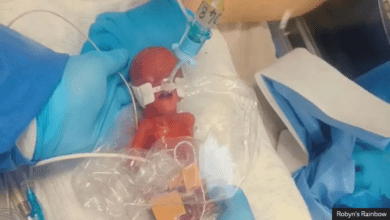Addressing The Abortion Pill Dilemma in a Post-Roe America

Why do women want to initiate abortions? “If we can change the hearts and minds around that, even if abortion is legal, it’s unthinkable.”, said Roland Warren, President and CEO of Care Net on the latest episode of CareCast.
Welcome to the latest episode of CareCast, Care Net’s podcast on family, faith, and life with Roland Warren, President and CEO of Care Net, and Vincent DiCaro, Care Net’s Chief Outreach Officer. Listen to Roland and Vincent’s conversation as they address the abortion pill dilemma and how to navigate abortion supply and demand in a post-Roe America.
Want to hear the podcast?
Find full access to the latest episode of CareCast.
The link above sends you to SoundCloud, you can also find this episode at iTunes and Spotify.
The following is a portion of the transcript from the CareCast recording with Roland Warren (RW) and Vincent DiCaro (VD).
Vincent DiCaro (VD): Roe v. Wade the reversal is a remarkable pro-life legal victory, and we’re glad it happened. But as we’ve discussed many times on this podcast, it really complicated things. The abortion landscape in America has become quite complicated since the overthrow of the Roe vs. Wadeand we really emphasized how important Care Net’s work is especially in this post-Roe environment.
Thus, in situations where abortion is more difficult to access, women and men who choose abortion still seek help. That’s still an unplanned pregnancy from their perspective, and they’re still looking for it. “I need support in this decision I have to make.” And so, you have in some ways more people in that situation, and frankly feeling more desperate and scared and urgent than ever before, because abortion is less accessible to them.
And so, it created a very complicated environment for this work and made it more important than ever. And one of the main factors that caused the complication was the availability of the abortion pill. So, just for argument’s sake, let’s say that half of the states in the country are pro-life and half of the states in the country are pro-choice. It’s amazing, and it’s great that there are state laws that protect the unborn and say half the states, but if there’s a pro-choice state right next door that can send you an abortion pill in your pro-life state, abortion still happens despite the fact that you live in a pro-life state with pro-life laws.
Unfortunately, the evidence is starting to mount that we can see quite a bit of that. Abortion pills are shipped across state lines to allow people in pro-life states to still have abortions.
Roland Warren (RW): People are doing things like setting up mailboxes in pro-choice states if you will, and so if they’re concerned, if the pill provider is concerned, if I send the pills it’s in the pro-life state, there may be some issues because it’s illegal, well they’ll send it to the pro-choice state and then they’ll do mail forwarding to move them into the pro-life state because at that point you don’t know what’s there.
VD: So there’s almost a sort of black market that thrives around the abortion pill. So very disturbing and you and I both studied economics and really what this is about is about supply and demand, right? And so pro-life laws obviously affect the supply, especially the supply of surgical abortions in a particular geographic location, right? But the demand for abortion is unlikely to change even if these pro-life laws are passed in that particular geographic location.
So the demand for abortion, again for the sake of argument, let’s say it doesn’t change. So where do the people who still want abortion come from? So if they can’t get a surgical abortion in a town they live in, they can drive across state lines or start tapping into this growing black market of abortion pills again.
And so it’s a sad tragedy, really, that when people want to do something that’s not necessarily a good thing, they find ways to do it, unfortunately. That leads to the work of Care Net. Care Net’s work is about, how do we address the demand side? How do we love and serve people who feel like they need to have an abortion to help them realize that they don’t have to? Roland, if you could talk about some of the reasons women have abortions and therefore how you serve them and kind of address the demand side?
RW: It’s unfortunate in our culture that we don’t do that, really address the demand side. We see the same kind of issue with the illicit drug trade, the same kind of thing, the war on drugs, right? A lot of that has been focused on, and the focus has been and remains on the supply side. How do we stop drugs from crossing our border? But not much focus on why people want to start drugs, right? Because if you get them across the border and nobody wants them, you know, it’s like some toy that used to be really hot and you’re, you know, we had a hard time getting—kids with cabbage caps or something man—bring it into the country. and then the demand dries up and it’s like, oh, we can easily get in. And people are like, well, so I don’t want that. And so I think the way we’ve always approached it is not just from a supply perspective but from a demand perspective.
And candidly, that’s what you see in the biblical narrative, right? That’s a lot of sin, isn’t it? But grace is more. In other words, there is a supply of opportunities to sin, but once you are changed by grace, your need for sin decreases. In other words, you become a new creation. You became a new person. And therefore, though sin and opportunities to sin abound, they abound—They are available to you. The supply chain is perfect, right? There is no friction in the supply chain. Demand decreased. And you’ll see that, you know, certainly with anyone who’s become a Christian, how your life has changed.
You still have the same supply or access to a lot of devices that, you know, led you down a certain path, but you don’t want those devices anymore. Why? Because the need has changed because the gospel of Jesus Christ has changed you. A large part of Care Net’s work is actually working on the demand side of it.
Why do women want to initiate abortions? If we can change the hearts and minds related to that, even if abortion is legal, it is unthinkable. It kind of brings me back to when I used to get questions early about, years ago, instead, about Roe v. Wade reversible and when Roe v. Wade reversible and can it be reversed and how quickly can we reverse it. Again, that’s a great focus and we should want that law off the books, but I always tell people, that Roe v. Wade is reversed daily. Every time a woman decides to bring her child into the world and refuse an abortion, she just reverses Roe v. Wade. This is the death of 1,000 cuts.
What does that mean? We have a certain power because you can talk to a woman, talk to a man, and have a life-affirming conversation and they can change their mind. Although the supply is there, abortion is fully available, the demand for it is not.
Roland and Vincent talked more about why women want abortions in the first placefrom missing support after birth to the role of the father and the role of the church in relation to support as well as how many lives Care Net has supported and how many gospel conversations have taken place.
Can’t find the podcast?
Here’s your full CareCast episode.
Don’t use SoundCloud? Find this episode at iTunes and Spotify.






